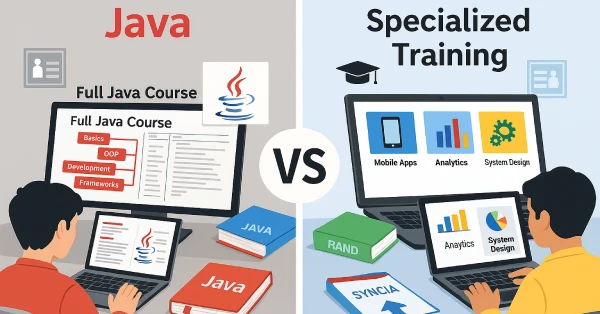Full Java Course vs. Specialized Training: Which to Choose?
When it comes to building a career in software development, Java continues to be one of the most reliable and in-demand programming languages. Java serves as the backbone for a wide range of cutting-edge systems, from large-scale enterprise applications to modern mobile solutions. However, for learners and professionals, the big question often arises: should you choose a complete Java course that covers everything in depth, or opt for specialized training that focuses on a particular framework or domain?
In our last blog, we explored how aspiring developers can showcase their expertise through a strong portfolio that highlights both front-end and back-end skills. Building on that foundation, this post shifts the focus to choosing the right learning path—whether to pursue a comprehensive program that covers Java in depth or opt for a specialized track designed to sharpen skills in a specific area.
What Is a Full Java Course?
A full Java course provides a complete journey through Java programming. It covers everything from the basics to advanced topics, ensuring students build a strong foundation. Key areas include:
Core Java: OOP Principles, Collections, Exception Handling
Advanced Java: Servlets, JSP, JDBC, Multithreading
Frameworks: Spring, Hibernate, RESTful APIs
Development tools: IDEs, Version Control, and Best Practices
This pathway is ideal for beginners or those switching to IT careers. By the end of such a course, learners are equipped to move confidently into advanced frameworks and enterprise-level projects.
What Is Specialized Training?
Specialized training narrows the focus to specific tools, domains, or frameworks. For example, many professionals choose Java full stack training to master end-to-end application development, including front-end, back-end, and databases.
These programs dive deeper into real-world industry practices, project development, and deployment strategies. Specialized courses are best suited for learners who already know the basics of Java and want to enhance their skills for specific roles like full stack developer, backend engineer, or cloud application developer.
Full Java Course: Advantages and Drawbacks
Advantages
Builds a strong and versatile foundation.
Prepares learners for multiple domains in IT.
Opens career opportunities in enterprise and system-level development.
Drawbacks
Requires more time and effort compared to focused programs.
May include topics not directly relevant to certain job roles.
Specialized Training: Advantages and Drawbacks
Advantages
Designed to match current industry needs.
Shorter duration, career-oriented approach.
Helps working professionals upskill or transition into specific roles.
Drawbacks
Not recommended for absolute beginners.
Provides less exposure to areas outside the chosen specialization.
Which Should You Choose?
If you are a beginner or planning a career switch to IT, a complete Java course is the best option to start with. It builds a foundation you can rely on when transitioning into advanced frameworks later. On the other hand, if you are already familiar with the basics of Java and looking to move into specific roles like a developer or architect, specialized training will help you upskill quickly and align with industry demands.
Conclusion
The choice between a complete Java course and specialized training depends on where you are in your learning journey. Beginners gain the most from comprehensive learning, while experienced professionals can accelerate their careers with focused training.
If you’re ready to take the next step, connect with our team today. As a trusted IT training institute in Bangalore, we provide expert guidance, hands-on learning, and placement-focused programs designed to help you succeed in your career.






